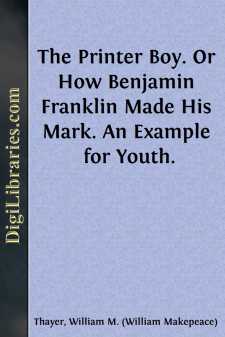Categories
- Antiques & Collectibles 13
- Architecture 36
- Art 48
- Bibles 22
- Biography & Autobiography 815
- Body, Mind & Spirit 144
- Business & Economics 28
- Children's Books 18
- Children's Fiction 14
- Computers 4
- Cooking 94
- Crafts & Hobbies 4
- Drama 346
- Education 58
- Family & Relationships 59
- Fiction 11829
- Games 19
- Gardening 17
- Health & Fitness 34
- History 1378
- House & Home 1
- Humor 147
- Juvenile Fiction 1873
- Juvenile Nonfiction 202
- Language Arts & Disciplines 89
- Law 16
- Literary Collections 686
- Literary Criticism 179
- Mathematics 13
- Medical 41
- Music 40
- Nature 179
- Non-Classifiable 1768
- Performing Arts 7
- Periodicals 1453
- Philosophy 65
- Photography 2
- Poetry 896
- Political Science 203
- Psychology 44
- Reference 154
- Religion 515
- Science 126
- Self-Help 85
- Social Science 82
- Sports & Recreation 34
- Study Aids 3
- Technology & Engineering 59
- Transportation 23
- Travel 463
- True Crime 29
Our website is made possible by displaying online advertisements to our visitors.
Please consider supporting us by disabling your ad blocker.
The Bobbin Boy or, How Nat Got His learning
Categories:
Description:
Excerpt
CHAPTER I.
A GOOD BEGINNING.
A little patch of ground enclosed by a fence, a few adjacent trees, Nat with his hoe in hand, his father giving directions, on one of the brightest May mornings that was ever greeted by the carol of birds, are the scenes that open to our view.
"There, Nat, if you plant and hoe your squashes with care, you will raise a nice parcel of them on this piece of ground. It is good soil for squashes."
"How many seeds shall I put into a hill?" inquired Nat.
"Seven or eight. It is well to put in enough, as some of them may not come up, and when they get to growing well, pull up all but four in a hill. You must not have your hills too near together,—they should be five feet apart, and then the vines will cover the ground all over. I should think there would be room for fifty hills on this patch of ground."
"How many squashes do you think I shall raise, father?"
"Well," said his father, smiling, "that is hard telling. We won't count the chickens before they are hatched. But if you are industrious, and take very good care indeed of your vines, stir the ground often and keep out all the weeds, and kill the bugs, I have little doubt that you will get well paid for your labor."
"If I have fifty hills," said Nat, "and four vines in each hill, I shall have two hundred vines in all; and if there is one squash on each vine, there will be two hundred squashes."
"Yes; but there are so many ifs about it that you may be disappointed after all. Perhaps the bugs will destroy half your vines."
"I can kill the bugs," said Nat.
"Perhaps dry weather will wither them all up."
"I can water them every day if they need it."
"That is certainly having good courage, Nat," added his father, "but if you conquer the bugs, and get around the dry weather, it may be too wet and blast your vines, or there may be such a hail storm as I have known several times in my life, and cut them to pieces."
"I don't think there will be such a hail storm this year; there never was one like it since I can remember."
"I hope there won't be," replied his father. "It is well to look on the bright side, and hope for the best for it keeps the courage up. It is also well to look out for disappointment. I know a gentleman who thought he would raise some ducks. So he obtained a dozen eggs, and put them under a hen, and then he hired a man, to make a small artificial pond in his garden, which he could fill from his well, for the young ducks to swim in. The time came for the ducks to appear, but not one of the eggs hatched, and it caused much merriment among the neighbors, and the man has never heard the last of counting ducks before they are hatched. I have heard people in the streets and stores say, when some one was undertaking a doubtful enterprise, 'he is counting ducks.' Now, possibly, your squashes may turn out like the gentleman's ducks, though I do not really think it will be so. I speak of it that you may think of these things."
A sly sort of smile played over Nat's expressive countenance at this mention of the ducks, but it did not shake his confidence in the art of raising squashes. He had become a thorough believer in squashes,—they were now a part of his creed. He could see them on the vines before the seeds were planted. Some of them were very large,—as big as a water-pail, and his glowing imagination set him to work already, rolling them into a wheelbarrow. He cared little for the bugs, though they should come in a great army, he could conquer them, infantry, artillery, and all.
This scene was enacted about thirty-five years ago, not a thousand miles from Boston, when Nat was about ten years old, a bright, active, energetic, efficient, hopeful little fellow. His father gave him the use of a piece of ground for raising squashes, and the boy was to have the proceeds of the crop with which to line his new purse....




